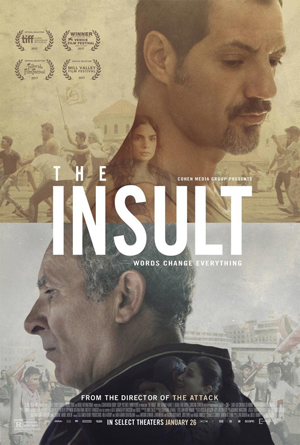The Insult starts with a minor dispute in a narrow residential street in Beirut over a drainpipe that spills water onto the street. It quickly escalates into a profanity-laden showdown between the engineer who tries to fix the pipe and the owner of the apartment from where the pipe protrudes. A punch is thrown and before either side can catch a breath the matter ends up in court.
The remarkable achievement of director Ziad Doueiri’s film is to take this dispute and add layer upon layer of social, political, religious and historical underpinnings, turning the tale into a masterclass on the entire Middle East. And he does this with entirely likable characters who are by no means stereotyped cutouts. The owner of the apartment, Tony Hanna, is a Christian and an ardent supporter of the ruling Lebanese Christian party. The engineer, Yasser Salameh, is a Palestinian Muslim who lives in a camp in Beirut with tenuous legal status. Their separate histories in Lebanon’s long civil wars and the Israeli-Palestinian conflict have effectively predetermined them to a confrontation, for which the drainpipe serves merely as the inciting incident.
Both men have strong wives who try to get them to back down, but the resentments the men have accumulated over the years from the hard lives they have lived propel them forwards. At one point an angry Tony tells Yasser he wished “Sharon (former Israeli Defense Minister) had wiped all you people out” – a highly incendiary insult that makes national news in Lebanon, where racial and religious insults are proscribed by law, for good reason.
As the trial goes on and the media descend on every utterance, demonstrations spread across Beirut and it looks like civil war could break out again. Even the president gets involved, summoning Tony and Yasser to his residence to ask them to settle their dispute to stop further violence. They both demur. And yet neither man wishes harm on the other: As they leave the residence, Yasser’s car won’t start and Tony, a mechanic by trade, helps him to fix it but without saying a word.
In the courtroom, Tony’s lawyer parses through the bloody history of Lebanon, saying, “No one has a monopoly on suffering.” Yasser’s lawyer is a woman and so is the presiding judge.
Like the two wives, Doueiri gives his female characters strong voices, pitting their rational and common sense approaches against the resentful pride of the men who cannot shed their historical baggage. In the Q&A after the film, Doueiri said, to widespread applause, that he was deliberately elevating the role of women in the film: “Empowering women in the Middle East is probably the best way to get us out of this turmoil. The Middle East is a self-inflicting wound.”

